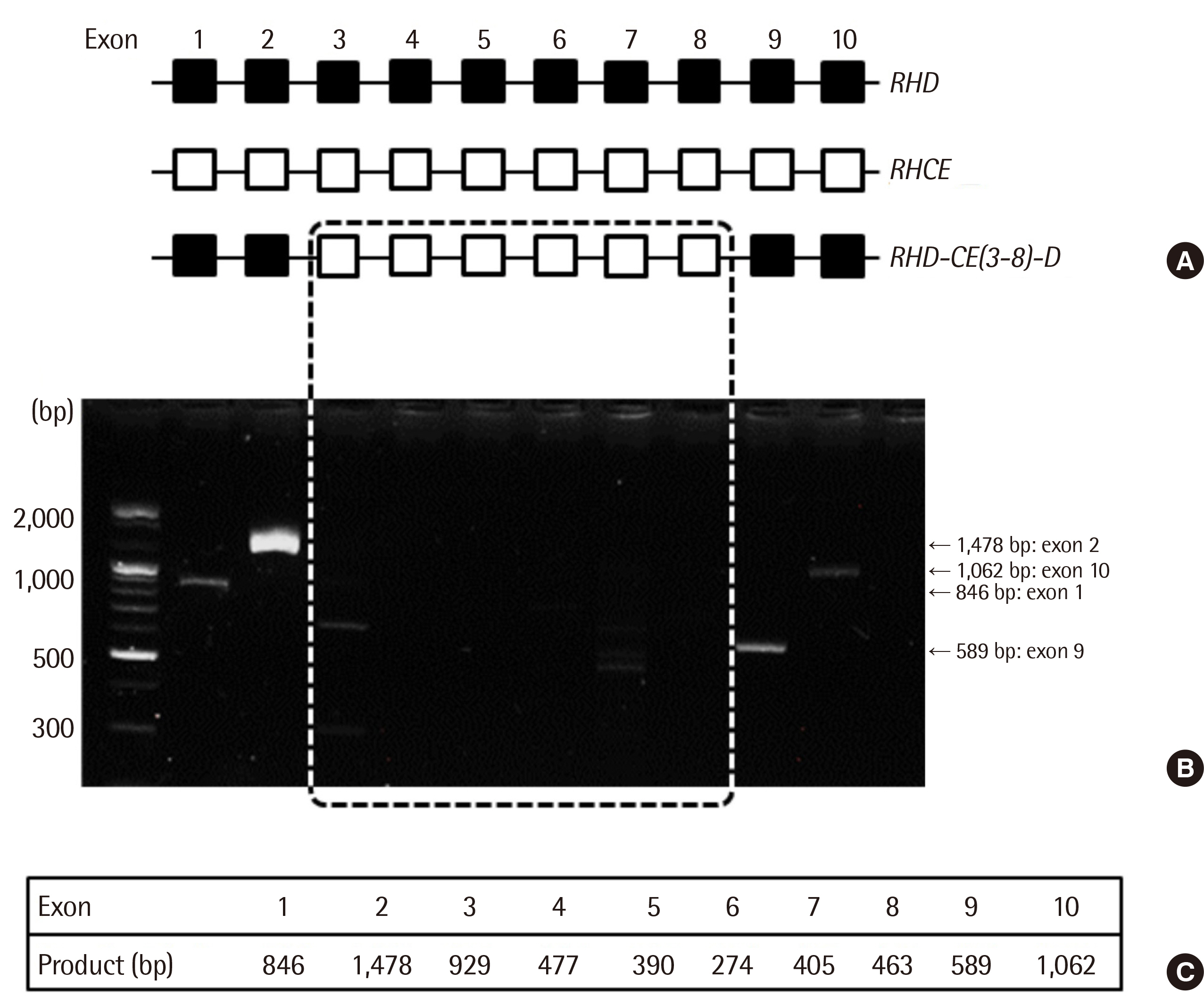Lab Med Online.
2022 Jul;12(3):201-204. 10.47429/lmo.2022.12.3.201.
The First Korean Case of RHD-CE(3-8)-D Hybrid Type with a D-negative Phenotype
- Affiliations
-
- 1Department of Laboratory Medicine and Genetics, Samsung Medical Center, Sungkyunkwan University School of Medicine, Seoul, Korea
- 2Department of Health Sciences and Technology, SAIHST, Sungkyunkwan University School, Seoul, Korea
- KMID: 2538606
- DOI: http://doi.org/10.47429/lmo.2022.12.3.201
Abstract
- RHD-CE-D hybrid alleles cause partial D or D-negative phenotypes depending on the crossing-over sites between RHD and RHCE. The RHD-CE(2-9)-D hybrid allele is the only hybrid form reported as D-negative in the Korean population. Here, we report the first Korean case of the RHD-CE(3-8)-D allele in a D-negative patient with heart failure. His blood sample was typed as D-negative by the automated microplate method (QWALYS-3 system; DIAGAST, France). Weak D test was weak positive, but false positive reactivity could not be excluded due to positive direct antiglobulin test. To confirm the RhD type, RHD genotyping was performed, and the RHD-CE(3-8)-D hybrid, known as D-negative allele, was identified. Upon the patient’s subsequent visit 7 months later, a follow-up RhD typing including an adsorption-elution test confirmed that the patient was D-negative.
Keyword
Figure
Reference
-
1. Kim JY, Kim SY, Kim CA, Yon GS, Park SS. 2005; Molecular characterization of D− Korean persons: development of a diagnostic strategy. Transfusion. 45:345–52. DOI: 10.1111/j.1537-2995.2005.04311.x. PMID: 15752151.
Article2. Singleton BK, Green CA, Avent ND, Martin PG, Smart E, Daka A, et al. 2000; The presence of an RHD pseudogene containing a 37 base pair duplication and a nonsense mutation in Africans with the Rh D-negative blood group phenotype. Blood. 95:12–8. DOI: 10.1182/blood.V95.1.12. PMID: 10607679.3. Seo MH, Won EJ, Hong YJ, Chun S, Kwon JR, Choi YS, et al. 2016; An effective diagnostic strategy for accurate detection of RhD variants including Asian DEL type in apparently RhD-negative blood donors in Korea. Vox Sang. 111:425–30. DOI: 10.1111/vox.12450. PMID: 27864976.
Article4. Fasano RM, Monaco A, Meier ER, Pary P, Lee-Stroka AH, Otridge J, et al. 2010; RH genotyping in a sickle cell disease patient contributing to hematopoietic stem cell transplantation donor selection and management. Blood. 116:2836–8. DOI: 10.1182/blood-2010-04-279372. PMID: 20644109. PMCID: PMC2974591.5. Wagner FF, Flegel WA. 2004; Review: the molecular basis of the Rh blood group phenotypes. Immunohematology. 20:23–36. DOI: 10.21307/immunohematology-2019-419. PMID: 15373666.
Article6. Kulkarni SS, Gogri H, Parchure D, Mishra G, Ghosh K, Rajadhyaksha S, et al. 2018; RHD-positive alleles among D− C/E+ individuals from India. Transfus Med Hemother. 45:173–7. DOI: 10.1159/000479239. PMID: 29928172. PMCID: PMC6006600.
Article7. Moussa H, Tsochandaridis M, Kacem N, Chakroun T, Abdelkefi S, Ga-bert J, et al. 2014; RHD positive among C/E+ and D-negative blood donors in Tunisia. Transfus Clin Biol. 21:320–3. DOI: 10.1016/j.tracli.2014.10.004. PMID: 25458985.
Article8. Yang HS, Chun S, Lee SA, Kwon JR, Choi YS, Kim JN, et al. 2017; Transfusion strategy of RhD-negative/variant patients in the Korean population. Lab Med Online. 7:89–93. DOI: 10.3343/lmo.2017.7.3.89.
Article
- Full Text Links
- Actions
-
Cited
- CITED
-
- Close
- Share
- Similar articles
-
- Application of Multiplex Ligation-Dependent Probe Amplification Assay for Genotyping Major Blood Group Systems Including DEL Variants in the D-Negative Korean Population
- Weak D Type 102 Found in a Family Study: The First Case in Korea
- Weak D type 33 Found in a Patient with a Weak D Phenotype: The First Case in Korea
- A Case Report of Anti-f(ce) Identified in a Patient with Pancreatic Cancer
- Transfusion of RhD-Positive Blood Components to Serologic RhD-Negative Patients-Review of Current Literature: An Opinion


